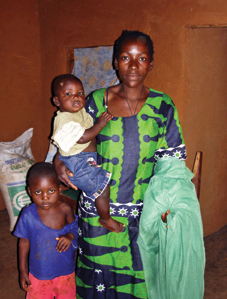A grant from PMI’s Malaria Communities Program allows CRWRC to address malaria prevention and treatment through local churches, which provide access to some of Malawi’s most remote communities.

Lifa Zakeyo, Matate village, Malawi, holds an ITN she received through PMI. Source: Phil Grabowski/CRWRC Malawi
Lifa Zakeyo from Matate village in Mchinji District, Malawi, has changed her behavior in preventing malaria, thanks to her neighbor Godfrey Nkhoma. Mrs. Zakeyo and many others in her community receive regular visits from Mr. Nkhoma, who has been trained to educate his neighbors about malaria prevention and treatment. He has taught them about the importance of using an ITN every night and of seeking early treatment for children with fever, and for pregnant women, taking intermittent preventive treatment. Mr. Nkhoma also shares messages about malaria at large gatherings in his area, where he uses a variety of communication techniques, including songs and drama or dance performances. Now Mrs. Zakeyo uses her mosquito net every night to protect herself and her four children from malaria: “In the past we only used our net in the rainy season when the mosquitoes keep us from sleeping well. Now we understand the importance of using a net every night of the year to prevent malaria.”
Mr. Nkhoma’s training was provided by his community’s Presbyterian church with funding and support from the Christian Reformed World Relief Committee (CRWRC). A grant from PMI’s Malaria Communities Program allows CRWRC to address malaria prevention and treatment through local churches, which provide access to some of Malawi’s most remote communities. This project has mobilized a total of 1,320 volunteers in 13 congregational areas. A representative of Mr. Nkhoma’s village expressed his appreciation of CRWRC’s work, stating, “Thank you for reaching our area with more education – we have a large population and a small health center.”
